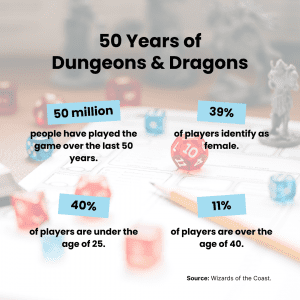Talk about a critical hit. Researchers at University College Cork have published a report that suggests that playing Dungeons & Dragons can be a boon for mental health.
This new study lays the groundwork for clinicians and psychologists to further investigate the fantasy tabletop role-playing game’s therapeutic potential.
D&D – as players call it – fosters creativity and collaboration by demanding frequent group meetings over extended periods.
“I love seeing D&D popularized for its therapeutic benefits,” Joel Frank, PhD, a licensed clinical psychologist and neuropsychologist at Duality Psychological Services, said. “Not only do I have a group I meet with weekly to play campaigns, but I’ve also utilized character-building and scenario management roleplays in groups I’ve facilitated in the past.”
A Recent Resurgence
The pandemic didn’t just mark the return of baking at home, handwashing, and jigsaw puzzles. It also resurrected a 50-year-old game – just like one of its characters. In 2020 alone, D&D sales jumped 33 percent, making it the most successful year in the game’s history.
So it makes sense that researchers would look at how the game influences the mental health of “average” players. The study, appearing in the latest edition of the International Journal of Role-Playing, revealed that players enjoyed a strong sense of control in-game, especially when they struggled with feelings of powerlessness in real life.
The study also identified other critical benefits, such as escapism, self-exploration, creative expression, caregiving, social support, and routine.
Orla Walsh, the study lead and a PhD researcher at UCC’s School of Applied Psychology, highlighted the benefits.
“Our research found that players discussed the benefits of escapism that accompanied playing D&D, and the positive impact that this had on their mental health,” Walsh said in a press release. “Players reported feeling a strong sense of control in-game … when they felt they did not have control outside of the game. Whilst many hobbies may allow for creative expression, D&D uniquely allows players to collaboratively build and inhabit worlds of their creation.”
Walsh also highlighted the emotional and social connections the games foster.
“The social support nurtured by playing D&D gives players emotional and social connection and offers them a space in which they can express themselves freely,” Walsh added. “While social support is a recognized benefit of many group activities, the collaborative storytelling aspect of D&D fosters a unique sense of camaraderie and shared experience among players.”
D&D as a Therapeutic Aid
The study suggests that D&D has significant potential for therapeutic use. Its players felt more comfortable exploring problems and practicing skills in a separate, safe space. Participants reported benefits in their everyday lives, such as increased autonomy and personal growth.
Conor Linehan, PhD, with UCC’s School of Applied Psychology, hinted at the broader implications of the research results.
“This study found that D&D can bring a myriad of benefits for players,” Linehan explained. “Although there are some clinicians and community groups that currently use role-playing games therapeutically, those groups are predominantly active in the United States. Our study suggests that a wider rolling out of such therapeutic role-playing groups may be of benefit in Ireland and across the globe, offering great potential to support skills development, emotional exploration, problem-solving, and fostering meaningful social connection.”
Dr. Linehan added, “The findings of this study have the potential to enhance our understanding of why D&D has proven successful in therapeutic settings. It provides a foundation for understanding how the game might be used as a tool in the future.”
This research highlights the importance of D&D as a tool for mental health support. It also encourages its broader application in therapeutic settings worldwide.
Cheryl Groskopf, an anxiety, trauma, and attachment therapist based in Los Angeles, is a player herself. And she’s used the game in her practice.
“D&D allows players to externalize their own feelings and struggles onto their characters,” she said. “This externalization can make it easier to explore and process emotions in a safe, controlled environment. For instance, a player might create a character with similar anxieties or fears. They may also explore how other characters in the game socialize with their character.”
She’s seen firsthand how the game can help build stronger social connections and communication skills.
“The game also encourages teamwork and critical thinking, as players must work together to overcome challenges,” she added. “Through play, I’ve seen shy and anxious individuals gain confidence and find their voice at the gaming table.”
Further Reading
Exploring the Addictive Nature of Fantasy Games Beyond Skill Mastery



